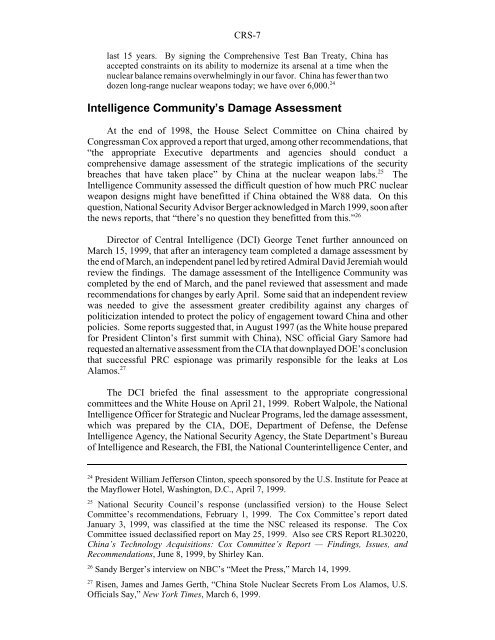China: Suspected Acquisition of U.S. Nuclear Weapon Secrets
China: Suspected Acquisition of U.S. Nuclear Weapon Secrets
China: Suspected Acquisition of U.S. Nuclear Weapon Secrets
You also want an ePaper? Increase the reach of your titles
YUMPU automatically turns print PDFs into web optimized ePapers that Google loves.
CRS-7<br />
last 15 years. By signing the Comprehensive Test Ban Treaty, <strong>China</strong> has<br />
accepted constraints on its ability to modernize its arsenal at a time when the<br />
nuclear balance remains overwhelmingly in our favor. <strong>China</strong> has fewer than two<br />
dozen long-range nuclear weapons today; we have over 6,000. 24<br />
Intelligence Community’s Damage Assessment<br />
At the end <strong>of</strong> 1998, the House Select Committee on <strong>China</strong> chaired by<br />
Congressman Cox approved a report that urged, among other recommendations, that<br />
“the appropriate Executive departments and agencies should conduct a<br />
comprehensive damage assessment <strong>of</strong> the strategic implications <strong>of</strong> the security<br />
breaches that have taken place” by <strong>China</strong> at the nuclear weapon labs. 25 The<br />
Intelligence Community assessed the difficult question <strong>of</strong> how much PRC nuclear<br />
weapon designs might have benefitted if <strong>China</strong> obtained the W88 data. On this<br />
question, National Security Advisor Berger acknowledged in March 1999, soon after<br />
the news reports, that “there’s no question they benefitted from this.” 26<br />
Director <strong>of</strong> Central Intelligence (DCI) George Tenet further announced on<br />
March 15, 1999, that after an interagency team completed a damage assessment by<br />
the end <strong>of</strong> March, an independent panel led by retired Admiral David Jeremiah would<br />
review the findings. The damage assessment <strong>of</strong> the Intelligence Community was<br />
completed by the end <strong>of</strong> March, and the panel reviewed that assessment and made<br />
recommendations for changes by early April. Some said that an independent review<br />
was needed to give the assessment greater credibility against any charges <strong>of</strong><br />
politicization intended to protect the policy <strong>of</strong> engagement toward <strong>China</strong> and other<br />
policies. Some reports suggested that, in August 1997 (as the White house prepared<br />
for President Clinton’s first summit with <strong>China</strong>), NSC <strong>of</strong>ficial Gary Samore had<br />
requested an alternative assessment from the CIA that downplayed DOE’s conclusion<br />
that successful PRC espionage was primarily responsible for the leaks at Los<br />
Alamos. 27<br />
The DCI briefed the final assessment to the appropriate congressional<br />
committees and the White House on April 21, 1999. Robert Walpole, the National<br />
Intelligence Officer for Strategic and <strong>Nuclear</strong> Programs, led the damage assessment,<br />
which was prepared by the CIA, DOE, Department <strong>of</strong> Defense, the Defense<br />
Intelligence Agency, the National Security Agency, the State Department’s Bureau<br />
<strong>of</strong> Intelligence and Research, the FBI, the National Counterintelligence Center, and<br />
24 President William Jefferson Clinton, speech sponsored by the U.S. Institute for Peace at<br />
the Mayflower Hotel, Washington, D.C., April 7, 1999.<br />
25 National Security Council’s response (unclassified version) to the House Select<br />
Committee’s recommendations, February 1, 1999. The Cox Committee’s report dated<br />
January 3, 1999, was classified at the time the NSC released its response. The Cox<br />
Committee issued declassified report on May 25, 1999. Also see CRS Report RL30220,<br />
<strong>China</strong>’s Technology <strong>Acquisition</strong>s: Cox Committee’s Report — Findings, Issues, and<br />
Recommendations, June 8, 1999, by Shirley Kan.<br />
26 Sandy Berger’s interview on NBC’s “Meet the Press,” March 14, 1999.<br />
27 Risen, James and James Gerth, “<strong>China</strong> Stole <strong>Nuclear</strong> <strong>Secrets</strong> From Los Alamos, U.S.<br />
Officials Say,” New York Times, March 6, 1999.
















